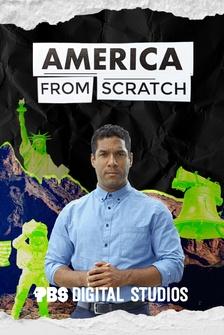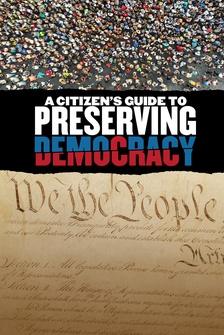GEOFF BENNETT: And here on the other side of our studio, we will be watching the results all night with our panel, which includes Amy Walter of The Cook Political Report With Amy Walter, Republican strategist Kevin Madden and Democratic strategist Faiz Shakir.
AMNA NAWAZ: Also with us all night is David Brooks, columnist at The New York Times, Jonathan Capehart, associate editor of The Washington Post, and, of course, our very own Judy Woodruff, who is back from her travels across the country for her series America at a Crossroads.
Welcome to you all.
(CROSSTALK) AMY WALTER, The Cook Political Report: Great to be here.
AMNA NAWAZ: All right, Amy, you're going to kick us off tonight.
We're going to be talking a lot... AMY WALTER: A lot.
AMNA NAWAZ: ... about the specifics and the data.
AMY WALTER: Yes.
AMNA NAWAZ: But just start us off big picture here.
What are you going to be watching tonight and what kind of big questions are you looking to answer?
AMY WALTER: Yes, I don't think I have ever experienced an election night like this, where we come in with the polls this close with so few people feeling like they have any sense of how this thing is going to break.
And I also come into this knowing that, when you look at the way Americans feel about our political system right now, the sense that they believe that this is an existential election for them, that my concern going forward is what happens to the numbers of people who will be very upset with what the result will be, because it's more than just an issue or a policy that they're voting on.
But, broadly, big picture-wise, what I'm looking at is to see if the coalitions that we have become comfortable with really for the past 15 years or so, with Democrats doing much better in high turnout elections because they run strong with younger voters, with voters of color who don't traditionally turn out in, say, a midterm year, or they're not -- they are not as typical voter -- they don't vote as regular, is the word I'm looking for, as white voters.
But now what we're looking at is a situation where it may be that Democrats are going to be able to find success not because they did better with younger voters or with voters of color, but because of their success with white voters, especially white voters with a college degree, and especially with women.
And I think we're going to be looking very closely at those breakouts when we go to the key battleground states.
GEOFF BENNETT: And on that point, Kevin, we do expect this race to be settled in the battlegrounds, chief among them Pennsylvania.
What are you watching for tonight in Philadelphia and the surrounding... (CROSSTALK) KEVIN MADDEN, Republican Strategist: Yes.
I mean, also, we should think back to even when we were here in January during the primaries.
We always said this is going to come down to about seven states.
And, in those seven states, it was going to be these metropolitan areas and places like Philadelphia.
So that's where I'm really watching for today.
In order for anybody, any one of these candidates to win, they're really going to have to do well in these collar counties of Philadelphia and the eastern side of Pennsylvania.
And so, for Trump, the charge has always been, is he going to be able to go out and win more voters beyond the Republican base?
Is he going to be able to maybe flip some suburban Democratic -- some suburban Republican women who may have voted for Nikki Haley in the primaries?
And would they come home for him in a general election?
That's going to be the big test.
So as we watch some of these numbers come out of Philadelphia, around the exurbs, up towards the Lehigh Valley, those are going to be some of the counties that I'm looking for to see where the splits are and where the margins are to see whether or not Trump was able to outperform where he was in 2020.
GEOFF BENNETT: And, Faiz, when the Harris campaign says that they feel like they have momentum on their side, what are they pointing to?
Is it just vibes or is there something tangible that they can point to and say, yes, we feel good about where we are?
FAIZ SHAKIR, Democratic Strategist: Geoff, in the early vote, they did a great job.
On the tactical side of this Harris campaign, you have seen extreme proficiency from the moment she got into this race, money raised, volunteers recruited, convention executed flawlessly, debate executed flawlessly.
She's in a great position.
When you looked at the early vote numbers, the gender gap was there and you say, running into Election Day, you're ahead.
And, obviously, they need to maintain it.
So, hopefully, they're counting on a lot of young people coming out today, knock on wood, in places like Detroit and Philadelphia and Dane County and Madison.
Hopefully, there's a huge youth turnout.
I also think, though, they have run this very cautious and determined campaign.
From the beginning, they made certain assumptions, Geoff, about what the electorate was.
And part of that judgment was people were ready to turn the page on Trump.
They had seen enough.
And they saw the Republican primaries, where 15 percent to 20 percent consistently showed that they were not with Trump in the Republican ranks.
And the Harris campaign focused on them like a laser.
That's why you had the Liz Cheney events, the Adam Kinzinger stuff, the Mark Cuban approach.
So I think you're going to do well with college-educated people, and I hope we can continue to keep the margins with non-college people.
That's one thing that I will be watching closely tonight.
AMNA NAWAZ: So, David Brooks, we're going to be spending a lot of time together tonight.
(LAUGHTER) DAVID BROOKS: Happy to be here.
AMNA NAWAZ: I have snacks.
Not to worry.
But you always do such a great job of giving us this historical context here.
We're going to find out obviously who wins and loses these races.
But what else do you think we learn about the country or where we are tonight?
(CROSSTALK) DAVID BROOKS: Yes, I want to know tonight, what political era are we in?
So between Ronald Reagan and I guess you would say Barack Obama, there was differences obviously between the parties, but there was some consensus, consensus about NATO, consensus about free trade, consensus that the future of the American commerce is in information-age jobs, and we should be training people to get through college so they can take advantage of the jobs of future.
That was sort of the Republican and Democratic consensus.
Along comes Donald Trump that says, forget that.
No free trade, no NATO, no transition to a postindustrial economy.
I'm going straight for the industry, or at least lip service, if not policy.
And so if Trump wins again, then the - - what we might call pejoratively the neoliberal era from Reagan through Obama, that's over.
That's in the rearview mirror, and we have entered a new populist age with Trump large and in charge.
AMNA NAWAZ: Jonathan, Amy mentioned a few key groups that we're going to be keeping an eye on.
Is there any one group, any one trend you're going to be watching more closely than others over the course of the evening?
JONATHAN CAPEHART: Funny you should ask.
(LAUGHTER) JONATHAN CAPEHART: Yes.
Yes, I am looking specifically at white women.
A lot of the narrative leading up to this election was Vice President Harris was losing Black men.
And the feeling was, well, if she loses the election, it will be because of Black men.
And as a Black man, that's kind of hard to take, especially when African American men are such a tiny percentage of the voting population, whereas white women are the largest voting bloc.
Now, Black women are the largest and most consistent voting bloc for the Democratic Party, 95, 98 percent.
But white women in the 2016 election were 41 percent of the electorate.
The exit polls then said that 52, 53 percent voted for Trump.
But a Pew Research analysis in 2018 came back and really looked and said it was 47 percent.
But he won the plurality of the white women vote.
If Vice President Harris is to get over the line, she needs to have white women do what Black women have been doing since Trump was elected, and that is saving democracy.
I did an event with Nikole Hannah-Jones and Heather Cox Richardson two weeks ago and asked her this question.
And, ultimately, she said to the white women in the audience, call your people, because we have done enough and now if we're going to save -- if we are all going to save the democracy, you have to do your part.
And she also has an essay in The New York Times, but that is what I'm watching for.
And that's why I'm watching for it, because, if anything, the Dobbs decision has been a motivating factor for women across the board and the people and men who love them.
But we have seen, at least I have seen white women galvanized in a way I have not seen.
And I'm hoping that it will mean a good night for the democracy.
GEOFF BENNETT: And, Judy, you have unique insight into the issues that are really driving voters, animating the electorate as a consequence of your reporting, your Crossroads reporting, where you have crisscrossed the nation.
What are your early impressions this evening?
JUDY WOODRUFF: Well, I have come away.
First of all, I'm glad to be here, other side of the desk.
(LAUGHTER) JUDY WOODRUFF: It was time for a change.
You guys have all the pressure.
(LAUGHTER) JUDY WOODRUFF: So, traveling around the country, trying to understand why we're so divided, I have to say, I come away with three things I am specifically looking for tonight, based on the reporting that I have done.
And I will just give you examples.
North Carolina, we were in Alamance County.
These are -- this is a rural area outside Raleigh-Durham.
For Kamala Harris to win that state, take it back from the Republicans, she needs to do well in these exurbs.
I think Kevin, Amy were talking about this, the suburbs that are outside the Raleigh-Durham, Charlotte.
So that's one place we're looking at.
We're also looking at Michigan, the so-called education, diploma divide, which is an increasing issue in American politics.
I was in just a couple of weeks ago in both Macomb and Oakland counties, the biggest counties in the state just north of Detroit, Oakland being a place, majority with a lot of people with college -- excuse me -- college graduates, Macomb being more blue-collar, fewer college graduates.
Joe Biden did very well in Oakland and won.
Trump won Macomb.
The question is, how are Harris and Trump going to do with people who have a college degree and don't?
And just quickly, Arizona, we went to look at the divide, the partisan split among Hispanic voters.
Last time, Hispanic voters in Arizona made up 19 percent of the electorate.
Biden was able to win 61 percent.
So the question is, Republicans are now saying they can cut into that.
Can they?
Can they take away some of the Hispanic vote, which is -- traditionally was going more Democratic?
AMNA NAWAZ: I think the other question with a shorter answer is, where haven't you been this election season?
(LAUGHTER) (CROSSTALK) AMNA NAWAZ: But, Amy, as Judy mentioned there, North Carolina, we know that's one of the states where polls will close on the earlier side, along with Georgia.
AMY WALTER: That's right.
AMNA NAWAZ: We keep saying it could be a long night.
We may not have an answer.
AMY WALTER: Right.
AMNA NAWAZ: Is there anything you're tracking early in the night specifically that you think gives us a direction of where things are going or that says this could be an earlier night than we expect overall?
AMY WALTER: I want to say yes, because I want to believe that we will have some direction early on in the evening.
But what we have come to see in our politics -- and, look, we talked about this the other night about seeing this Iowa poll that looked so outside of what we have been seeing in other states.
(CROSSTALK) AMNA NAWAZ: Do expect that to come up again tonight, by the way.
We will ask you about Iowa.
AMY WALTER: OK.
But you think about the billions of dollars that have been spent on this election.
They have all been spent in seven states.
And so there are a lot of people in these other states that have not been getting the barrage of advertising and just the communication from the campaigns.
How they behave may not tell us how the swing states are going to behave, and how the swing states behave may not tell us how those other states are going to behave.
And that's true too when we're thinking about all these House races and these Senate races.
I am looking -- I think I will give you one clue.
The Ohio Senate race, I think, will give us an idea for just what we -- what kind of Senate we could expect, what the margin may look like in the Senate.
AMNA NAWAZ: And tell us about that.
Why?
AMY WALTER: Because this is a state where right now it's very, very close.
Even though it's a red state, the Democratic senator there has been tied with his opponent.
To win, it would mean that he would need to win a lot of Trump voters.
If that's the case, if we do see real ticket-splitting, then it means that the Senate and the House become much less predictable, because we're just so used to, if it's a red state, it goes red, if it's a blue state, it goes blue.
And if Sherrod Brown were to hold on in Ohio, it suggests too that Democrats are going to have a much better night in the Senate.
Doesn't mean necessarily they're going to hold the Senate, but that would be a better night.
If he loses, now we're into that was the more expected way that you would look at the Senate map, given how Republican Ohio is.
GEOFF BENNETT: Yes.
And in the 30 seconds or so that we have left, how has he been able to hold on to that seat as Ohio has become redder and redder?
AMY WALTER: I knew it.
One, it helps to be an incumbent who's been there for a long time with an identity that fits the state.
But the other is that they have just, quite frankly, outspent and been able to define their Republican opponent in a way that is helpful to the senator, Senator Sherrod Brown.
And really they have been on offense almost entirely in this campaign.
Yes, it's been quite something.
GEOFF BENNETT: The most expensive U.S. Senate race in history.
I feel like we say that about a Senate race in every election cycle, but the Ohio one is the one this time around.
AMY WALTER: Every two years.
And it will be every two years, yes.
Yes.
GEOFF BENNETT: All right, our thanks to our panel.
They're going to stay around with us.
They will be here all night.










